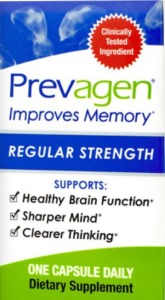 Here’s the truth that Prevagen doesn’t want you to know: brain supplements don’t work. Prevagen, in particular, is a well known scam that the Federal government has been trying to shut down. In January 2017, the Federal Trade Commission and the New York State Attorney General sued the maker of Prevagen for its misleading ads. According to those agencies, “….the marketers of Prevagen preyed on the fears of older consumers experiencing age-related memory loss.” In November 2020, a federal judge approved a nationwide class action settlement that requires the makers of Prevagen to provide cash payments to people who purchased the product.
Here’s the truth that Prevagen doesn’t want you to know: brain supplements don’t work. Prevagen, in particular, is a well known scam that the Federal government has been trying to shut down. In January 2017, the Federal Trade Commission and the New York State Attorney General sued the maker of Prevagen for its misleading ads. According to those agencies, “….the marketers of Prevagen preyed on the fears of older consumers experiencing age-related memory loss.” In November 2020, a federal judge approved a nationwide class action settlement that requires the makers of Prevagen to provide cash payments to people who purchased the product.
That’s right. Repeated scientific studies have demonstrated that nutritional supplements just don’t deliver. Most recently, a study funded by AARP found that even though antioxidants in food is beneficial, antioxidants in pill form simply don’t offer the same benefits. In fact, a number of scientific studies have been unable to show that antioxidants given in pill form improve or protect memory from declining with age or brain disease.
So what exactly is Prevagen offering?
Prevagen is not so much a nutritional supplement as a sophisticated sales pitch. Like many heavily-advertised supplements, this one makes many claims. The bottle promises it “improves memory” and “supports: healthy brain function, sharper mind, clearer thinking.” Never mind that the main ingredient in jellyfish (apoaequorin) has no known role in human memory, or that many experts believe supplements like this would most likely be digested in the stomach and never wind up anywhere near the brain. If you peruse their website, you’ll see no formulation of the ingredients for their “smart drugs”. The website says only that the capsules are “pack full of ingredients” (sic). Nor will you see the price for these supplements. The website offers nothing but empty and unquantifiable promises……along with embarrassing typos.
Here’s the thing about brain drugs — they are bogus. So much so that the Federal Trade Commission issued a consumer warning in 2016 urging consumers to avoid buying any “brain boosters” advertised on the Internet. As described by AARP: “The swindlers claim that the pills will lead to an increase in concentration and memory recall, but there is no evidence to support these claims, according to the FTC. These web pages have no affiliation with the legitimate news sites they mimic, nor are the fake articles true — the scammers are simply conning consumers into buying their product.”
Like so many of the “brain boosting” products peddled on the Internet, you are treated to slick videos, slicker webpages full of scientific sounding terms and, in many cases, a medical doctor who is recommending the product. But most of these kinds of products are rip-offs and infoscams that have infected the Web over the last three years.
Why Scammers Target Seniors
The Internet is littered with complaints about this product, ranging from unauthorized charges to selling nothing more than caffeine pills. Like BrainPlus IQ and Bio-Brain, these products are all hype and lies, with no record of effectiveness. The marketers know that seniors struggling with memory loss are desperately searching for ways to reverse this condition.
That’s why the Food and Drug Administration recently cracked down on this brain-supplement market, sending warning letters or advisories to 17 companies selling about 60 supplements. The agency reiterated that current science does not support any marketing claim that food supplements can reverse any type of known dementia or cognitive impairments. Over the past five years, the agency has taken action against 40 other products making Alzheimer’s claims.
Beware of Fake Reviews
Is it a scam? Is it a rip-off? Does it work? You’ll never find out, largely because of an increasingly pernicious Internet industry that uses fake product review sites to hide customer reactions.
We call these sites infoscammers because they mostly follow the same template: Product Description, Examination Record, Review or Analysis, Site Preview, Download button, Pros and Disadvantages and Conclusion. Many of them also have a Leave Page Pop-Up that makes it difficult to return to your Google search. They are hawked by affiliate websites that come by a whole array of names, such as “Daily Scam Reviews“, “Review Tools” “Scam Review Today“, “ScamX”, “Queen’s Reviews” and other such sounding websites. The vast majority of them are little more than automated shills for these scam sites, designed to conceal real scam reports. They are authored by professional fake review writing services or “reputation management” companies. While they are all hawking different “products”, the share many common sales tactics:
- They have a link or embedded video of the product/service offer. If the outgoing link on the review product includes an affiliate tracking code, then you can be sure they are being compensated by the link.
- They don’t have a link describing the qualifications of the “reviewer”.
- Many of them don’t have a “Contact Us” menu or reveal information about the reviewing organization itself.
- The quality of the writing is odd — either bad translations or boilerplate sounding sentences.
- The information at the web site is limited to reviews. If the entire site is nothing seemingly impartial reviews, then the author has no expectation of having visitors return, and consequently, no risk of losing regular visitors.
- They make some urgent Requirement for Paying a Fee or Payment. If the deal requires an advance fee or some kind of urgent response or cash payment. If you feel any pressure to make a decision, don’t do it. Responsible financial advisors do not rush prospective clients into hasty, and regrettable, decisions. They should welcome your scrutiny. In fact, use the Internet to do a search for any transactions in which they’ve been involved and see what others say.
How To Actually Boost Your Brain For Free
Perhaps most importantly, you don’t have to spend any money at all. There is an abundance of free or low-cost brain health information on the Internet. Amazon offers a number of ebooks that cost nothing and provide the kinds of well-established brain exercises that can help. And very reputable medical institutions such as Harvard and the Mayo Clinic offer free and documented information. Harvard, in particular, warns that excess weight,poor eating habits and lack of exercise are the major factors linked to brain disease. The Mayo Clinic suggests use of brain exercises, such as those offered by a number of legitimate Internet companies who offer FREE interactive brain exercises: Neuronation, Mind Games, Brain Matrix, as well as low-cost offerings by BrainHQ and Rosetta Stone.
As importantly,recent science suggests that some brain deterioration can be attenuated and, perhaps, reversed for far less than $50 per month. But the key steps needed are eliminating all simple carbohydrates from your diet, increasing consumption of fruit, vegetables and non-farmed fish, incorporation of yoga and meditation and daily supplements including vitamin D3, fish oil, coenzyme Q10, melatonin and for women to resume hormone therapy, if they had ended it.
While the supplement part of this recommendation is somewhat controversial, the lifestyle changes are not; they promote healthfulness, which is an essential element in keeping the brain healthy. There is a plethora of free and peer-reviewed analysis, like this, on the web and new studies that are revealing more light into the causes and treatment of brain deterioration.
One additional warning: once you give them your money, you’ll be tagged as “meat”. Once they know that you’ll fall for this pitch, the same marketers will be coming back to you over and over and over for other such pitches. So understand that if you pay these marketers anything….let alone $90…..they’ll continue to hound you with more slick schemes designed to prey on your fears and concerns. Our advice: don’t open your door or wallet to them.

